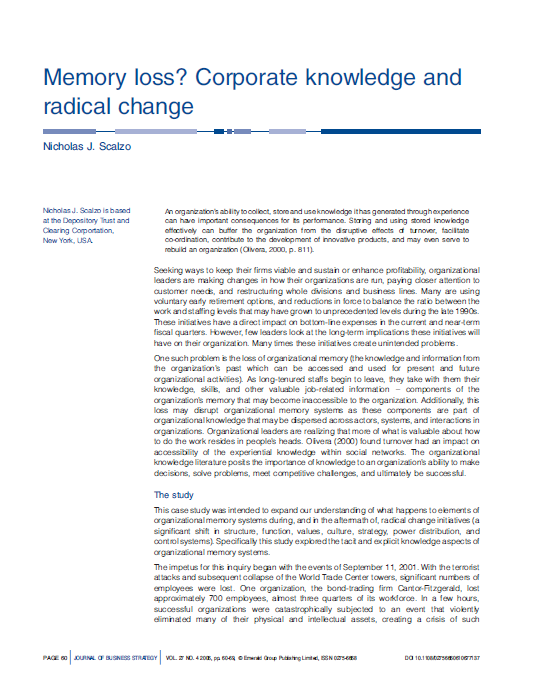The following is an excerpt from Dr. Nicholas Scalzo’s article, Memory Loss? Corporate Knowledge and Radical Change, published in the Journal of Business Strategy, Vol. 27, No. 4, 2006. Download the full article (PDF, 414KB).
An organization’s ability to collect, store and use knowledge it has generated through experience can have important consequences for its performance. Storing and using stored knowledge effectively can buffer the organization from the disruptive effects of turnover, facilitate co-ordination, contribute to the development of innovative products, and may even serve to rebuild an organization (Olivera, 2000, p. 811).
Seeking ways to keep their firms viable and sustain or enhance profitability, organizational leaders are making changes in how their organizations are run, paying closer attention to customer needs, and restructuring whole divisions and business lines. Many are using voluntary early retirement options, and reductions in force to balance the ratio between the work and staffing levels that may have grown to unprecedented levels during the late 1990s. These initiatives have a direct impact on bottom-line expenses in the current and near-term fiscal quarters. However, few leaders look at the long-term implications these initiatives will have on their organization. Many times these initiatives create unintended problems.
One such problem is the loss of organizational memory (the knowledge and information from the organization’s past which can be accessed and used for present and future organizational activities). As long-tenured staffs begin to leave, they take with them their knowledge, skills, and other valuable job-related information – components of the organization’s memory that may become inaccessible to the organization. Additionally, this loss may disrupt organizational memory systems as these components are part of organizational knowledge that may be dispersed across actors, systems, and interactions in organizations. Organizational leaders are realizing that more of what is valuable about how to do the work resides in people’s heads. Olivera (2000) found turnover had an impact on accessibility of the experiential knowledge within social networks. The organizational knowledge literature posits the importance of knowledge to an organization’s ability to make decisions, solve problems, meet competitive challenges, and ultimately be successful.

